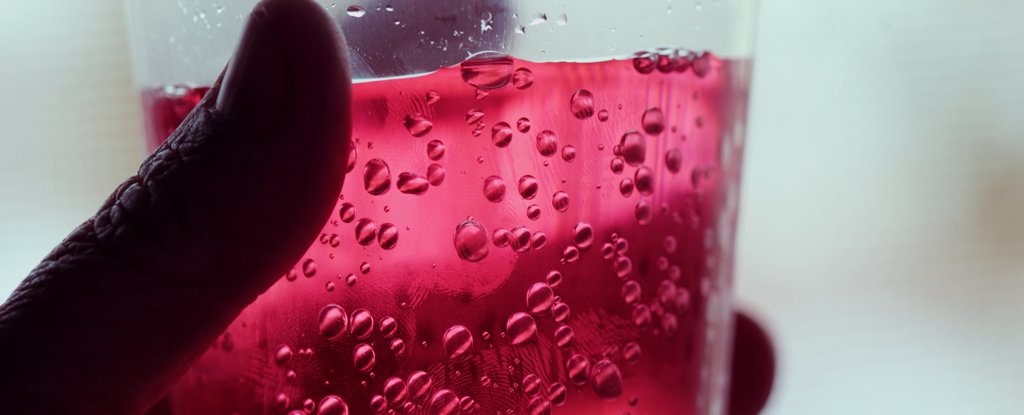Products You May Like
If you’re going to gargle something next time you go for a run, here’s some free advice: Try using a pink-colored drink. As strange as it sounds, pink drinks appear to be linked with enhanced running performance.
In a new study, scientists found that runners who rinsed their mouths with a pink-colored liquid solution – as opposed to a clear, identical-tasting one – ran for longer and at a faster average speed, while having a more enjoyable running experience too.
“Adding a pink colorant to an artificially sweetened solution not only enhanced the perception of sweetness, but also enhanced feelings of pleasure, self-selected running speed, and distance covered during a run,” explains performance nutritionist Sanjoy Deb from the University of Westminster in the UK.
Before you make a beeline for the drinks aisle in your local supermarket, though, let’s get some caveats out of the way.
This is a small study that only involved 10 participants in total, so bear that in mind. Plus, as with any experiment like this, all the researchers found was an association with pink drinks – not definitive scientific confirmation that pink drinks actually cause your legs to move quicker or anything like that.
That said, the results are certainly suggestive that pink-colored drinks could be making a significant difference to people’s overall running performance… so how exactly is that possible?
According to the researchers, the answers have to do with how our bodies respond to energy intake during exercise, even if it’s only perceived energy intake.
Previous studies have already shown that performance in sports like running and cycling seems to be enhanced when people use carbohydrate mouth rinses, with the stimulus thought to deliver a boost to areas in the brain involved with motor output and reward system functions – effects that may make exercise seem simultaneously more pleasurable and less tiring.
Caffeine is another substance that can deliver enhancements to physical performance, but the same kinds of benefits can be realized without actually consuming energy or stimulants, it seems.
As for the specific color pink, the team chose this based on previous research that has demonstrated we associate pink with sweetness.
“Although there may be no immediate link between drink color, taste perception and performance nutrition, if the color pink is associated with perceived sweetness, and therefore expectations of sugar/carbohydrate intake, it may be plausible that the provision of a pink-colored mouth rinse during exercise may elicit a similar ergogenic [performance-enhancing] benefit to that of carbohydrate mouth rinse through a potential placebo effect,” Deb and his co-authors write in their new paper.
To test their placebo effect hypothesis, the researchers recruited 10 fit, healthy adults experienced with running as part of their regular exercise, and got them to run on a treadmill for 30 minutes, with instructions to set their own speed for a challenging workout.
At several times during the experiment, the volunteers were asked to rinse their mouths out with an artificially sweetened, non-caloric solution – either a clear liquid, or the same solution colored pink with a food dye (but otherwise identical to the clear drink).
That one simple addition made a notable difference to running performance, the researchers say, with the pink drink linked to an average speed boost of roughly 0.5 kilometers (about 0.3 miles) per hour, which in the experiment meant an extra 213 meters (almost 700 ft) being run, for an overall 4.4 percent improvement in performance.
“An increase in feelings of pleasure was also reported during exercise in the pink mouth rinse condition, a potential psychophysiological mechanism which may have underpinned the performance improvement reported,” the authors write.
This mechanism, the researchers suggest, is underpinned by a placebo effect, in which the runners may have expected to receive an energy boost from potential sugar/carbohydrate consumption in the sweet-tasting mouth rinse they used.
It’s worth noting that prior to the experiment, the participants did watch a video detailing the performance-enhancing benefits of carbohydrate mouth rinses, and were informed that the tests they were about to undertake were designed to measure the effects of mouth-rinsing two commercial sports drinks.
That was a ruse, of course, designed to ‘blind’ the volunteers to what the experiment was actually about. But it also means they were perhaps primed for a placebo effect to happen – in a way that might be difficult to replicate at home by simply gargling pink-colored liquid when you go for a run. (Could still be worth a shot though!)
In any case, it’s a pretty fascinating result, and one that the researchers say warrants further investigation in future studies – to see just how far this pink (and maybe other colored) placebo effect might extend in terms of potential performance enhancement during exercise and sport.
Oh, and if you are going to rinse your mouth with something when you exercise, maybe steer clear of actual mouthwash. That has some pretty weird effects, too.
The findings are reported in Frontiers in Nutrition.
